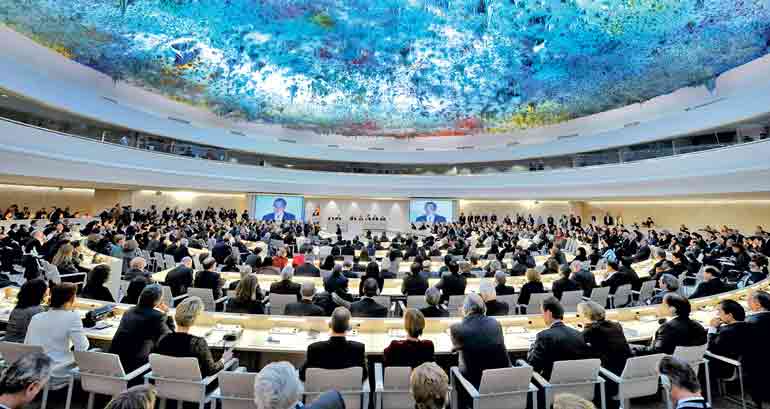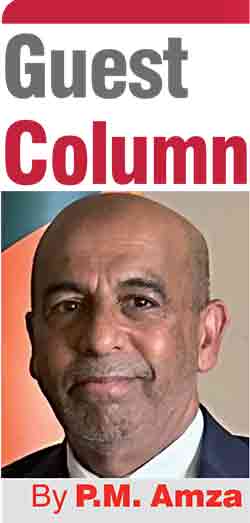Sunday Feb 22, 2026
Sunday Feb 22, 2026
Tuesday, 9 September 2025 00:00 - - {{hitsCtrl.values.hits}}

Selectivity weakens not only resolutions on Sri Lanka but the credibility of the entire multilateral system
Introduction: Sri Lanka’s story of reconciliation
More than 15 years have passed since Sri Lanka’s armed conflict ended in May 2009. The years since have been difficult, but also marked by important progress. Successive Governments have pursued policies of reconciliation and accountability. The Lessons Learnt and Reconciliation Commission (LLRC), appointed in 2010, produced a comprehensive report in 2011 with recommendations on governance, reconciliation, and human rights. In 2016, Parliament established the Office on Missing Persons (OMP) to trace thousands unaccounted for during the war, and in 2018 the Office for Reparations was created to address the needs of victims and their families.
 Among the most remarkable achievements has been the rehabilitation of nearly 12,000 former LTTE combatants—including several hundred child soldiers—who have since been reintegrated into society as productive citizens. This program provided vocational training, education, psychosocial support, and community reinsertion, enabling thousands once involved in violence to rebuild their lives peacefully. In scale and success, this is widely regarded as a unique achievement in contemporary conflict resolution, a model of disarmament, demobilisation, and reintegration (DDR) rarely matched elsewhere.
Among the most remarkable achievements has been the rehabilitation of nearly 12,000 former LTTE combatants—including several hundred child soldiers—who have since been reintegrated into society as productive citizens. This program provided vocational training, education, psychosocial support, and community reinsertion, enabling thousands once involved in violence to rebuild their lives peacefully. In scale and success, this is widely regarded as a unique achievement in contemporary conflict resolution, a model of disarmament, demobilisation, and reintegration (DDR) rarely matched elsewhere.
Alongside this, nearly all internally displaced persons have been resettled, significant areas of land once under military control have been returned to civilian use, and infrastructure in war-affected provinces has been steadily restored. Roads, schools, and hospitals now serve communities once devastated by conflict. Sri Lanka has also engaged constructively with international mechanisms, including the Universal Periodic Review and visits by special rapporteurs, despite limited resources and political transitions.
These achievements do not erase the challenges that remain, but they demonstrate that Sri Lanka’s reconciliation project has been genuine and nationally driven. It deserves acknowledgment alongside criticism.
Accountability as a long-term process
The global experience of transitional justice shows clearly that accountability is not an overnight event but a generational process. Rebuilding trust among divided communities, investigating complex wartime abuses, and reforming institutions take decades even in established democracies.
To expect Sri Lanka to conclude this journey in little more than a decade—while simultaneously weathering a global pandemic, a devastating financial crisis, and political upheaval—is neither realistic nor fair. Time and space are essential. Yet at the UN Human Rights Council (UNHRC), Sri Lanka is repeatedly singled out for urgent, sweeping action without context or recognition of the progress already made.
The Core Group and its record
The Core Group on Sri Lanka, which sponsors resolutions at the UNHRC, is currently led by the United Kingdom and joined by Canada, Malawi, Montenegro, and North Macedonia. These countries speak forcefully on accountability in Colombo. But their own records reveal serious shortcomings. The contrast exposes a troubling double standard.
It is worth recalling that the United States and Germany were also part of the Core Group in earlier years, co-sponsoring Sri Lanka resolutions until around 2022. Their absence from the current lineup reflects shifting diplomatic priorities opting to raise issues through bilateral channels, a desired and accepted route by democracies. The present Core Group, however, is smaller, with only five members taking the lead.
Sri Lanka must continue to address grievances from the civil war. That is not in dispute. But the issue at Geneva is less about whether accountability is necessary than about who sets the standard and how consistently it is applied. When the UK closes the book on Bloody Sunday with an apology but no prosecutions, when Canada struggles to deliver justice to indigenous communities, when Malawi faces systemic governance failures, and when Montenegro and North Macedonia have their own accountability deficits—how credible are their demands for immediate and sweeping action in Sri Lanka? This is not an argument for impunity. It is an argument for fairness, context, and universality
The United Kingdom: Selective memory of accountability
The UK is the loudest critic of Sri Lanka at the UNHRC, but its own history illustrates how slow and incomplete accountability can be.
Consider Bloody Sunday in Derry, Northern Ireland, on 30 January 1972, when British paratroopers shot dead 14 unarmed demonstrators. For decades, successive governments resisted full inquiry. Only in 1998—twenty-six years later—did Prime Minister Tony Blair establish the Saville Inquiry. Its report appeared in 2010, nearly thirty-eight years after the killings, concluding the shootings were “unjustified and unjustifiable.” Then–Prime Minister David Cameron issued an apology in Parliament. Yet, despite the gravity of the crimes, no soldier has ever been convicted, and in 2021 prosecutions were formally dropped. A belated apology without judicial redress sits uneasily beside Britain’s insistence on immediate accountability in Sri Lanka.
Nor is the UK’s contemporary record reassuring. In 2024, it enacted the Safety of Rwanda Act, permitting asylum seekers to be relocated to Rwanda despite the UK Supreme Court ruling the plan unsafe and UNHCR warnings of rights violations. At the same time, London only partially suspended arms exports to conflict zones during the Gaza war, leaving critical F-35 fighter jet components untouched. Domestically, civic freedoms have narrowed: over 400 arrests followed the banning of the activist group Palestine Action, raising questions about freedom of assembly.
The message is unmistakable: accountability is demanded abroad, delayed or diluted at home.
Canada: Indigenous injustices and arms deals
Canada likewise presents itself as a global defender of rights. Yet its domestic record reveals stark contradictions.
The country continues to grapple with the legacy of residential schools and the ongoing crisis of Missing and Murdered Indigenous Women and Girls (MMIWG). Ottawa’s own reports concede “challenges” in implementing the UN Declaration on the Rights of Indigenous Peoples. Justice for Indigenous communities remains elusive.
On migration, Canada has followed a restrictive course. In 2025, Bill C-2 was adopted, limiting access to asylum procedures and criticised by Amnesty International as undermining refugee rights. At the same time, Canada has continued lucrative arms exports to conflict-affected regions despite credible evidence of civilian harm, raising questions about its commitment to global human rights standards.
These contradictions weaken Canada’s moral authority when it co-sponsors accountability resolutions against Sri Lanka.
Malawi: Governance gaps and rights concerns
Malawi, a current UNHRC member, faces serious human rights concerns of its own. Reports by international rights organisations highlight inhuman prison conditions, with inmates often held at more than triple capacity and deprived of adequate food and healthcare. There have also been repeated incidents of excessive force by police, including unlawful killings during protests. In addition, Malawi struggles with child labour and trafficking in agriculture, problems that remain widespread despite legal prohibitions.
These systemic governance and rights challenges expose a gap between Malawi’s domestic record and its role as a co-sponsor of accountability resolutions abroad.
Montenegro: Accountability gaps at home
Montenegro continues to struggle with corruption, weak judicial independence, and unresolved war crimes cases from the Yugoslav conflicts. International monitors highlight persistent impunity and political influence over prosecutors. Until Podgorica addresses these structural issues, its voice on Sri Lanka’s accountability lacks credibility.
North Macedonia: Migrants on the margins
North Macedonia has faced criticism for its treatment of migrants and refugees. Reports by human rights organisations document pushbacks at borders, denial of asylum access, and poor reception conditions. For a state aspiring to EU membership, such practices are inconsistent with international obligations and weaken its credibility when advocating accountability elsewhere.
The question of consistency
Sri Lanka must continue to address grievances from the civil war. That is not in dispute. But the issue at Geneva is less about whether accountability is necessary than about who sets the standard and how consistently it is applied.
When the UK closes the book on Bloody Sunday with an apology but no prosecutions, when Canada struggles to deliver justice to indigenous communities, when Malawi faces systemic governance failures, and when Montenegro and North Macedonia have their own accountability deficits—how credible are their demands for immediate and sweeping action in Sri Lanka?
This is not an argument for impunity. It is an argument for fairness, context, and universality. The legitimacy of the UNHRC depends on consistent application of human rights principles. Selectivity weakens not only resolutions on Sri Lanka but the credibility of the entire multilateral system.
Conclusion: Time, space, and equal standards
Sri Lanka’s reconciliation journey is unfinished, but it is real. The rehabilitation of 12,000 former combatants including child soldiers, the resettlement of displaced persons, the return of land, and the establishment of accountability institutions are concrete achievements. Like every other post-conflict society, Sri Lanka needs time, space, and sustained support to complete this process.
The Core Group’s members would do well to reflect on their own histories. If the UK required nearly 40 years to acknowledge Bloody Sunday, if Canada still struggles with Indigenous reconciliation, and if others in the group wrestle with compliance at home, then surely Sri Lanka deserves understanding for seeking its own path within its own time frame.
Double standards at Geneva help no one. They delegitimise the Council, undermine faith in international human rights, and fuel resentment rather than reform. The real path forward lies in consistency—holding every state, large or small, to the same standards, with the same patience and respect.
References:
(The writer is former Sri Lankan Ambassador to EU, Belgium, Turkey and Saudi Arabia.)